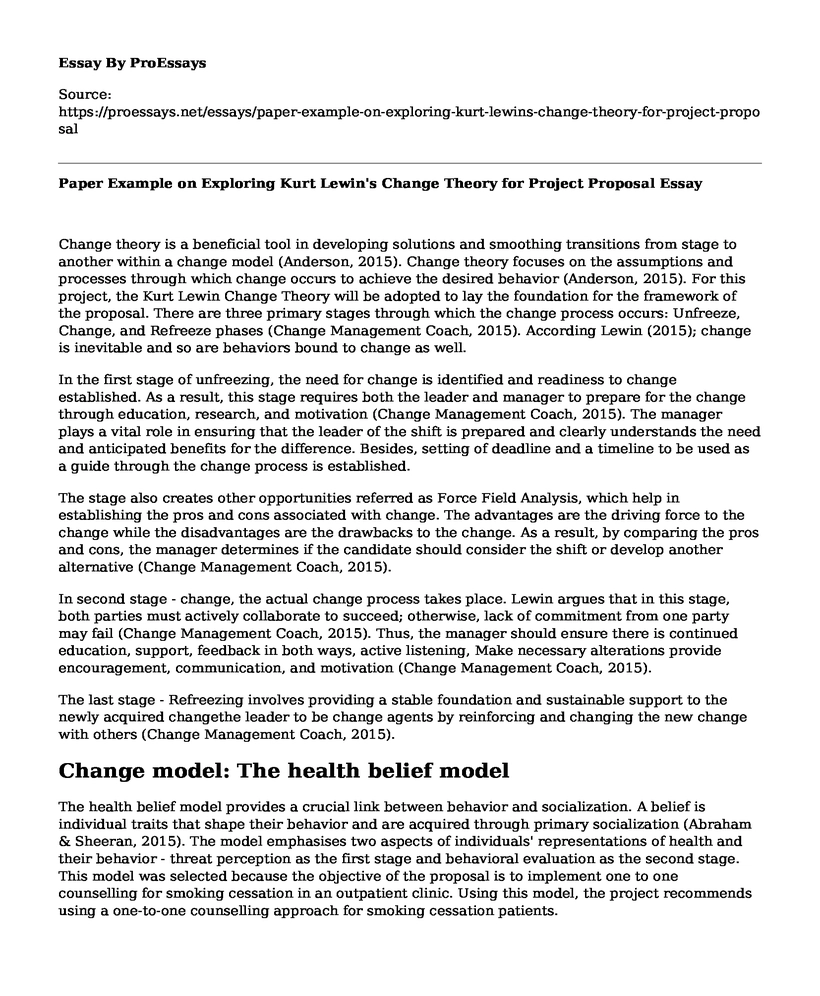Change theory is a beneficial tool in developing solutions and smoothing transitions from stage to another within a change model (Anderson, 2015). Change theory focuses on the assumptions and processes through which change occurs to achieve the desired behavior (Anderson, 2015). For this project, the Kurt Lewin Change Theory will be adopted to lay the foundation for the framework of the proposal. There are three primary stages through which the change process occurs: Unfreeze, Change, and Refreeze phases (Change Management Coach, 2015). According Lewin (2015); change is inevitable and so are behaviors bound to change as well.
In the first stage of unfreezing, the need for change is identified and readiness to change established. As a result, this stage requires both the leader and manager to prepare for the change through education, research, and motivation (Change Management Coach, 2015). The manager plays a vital role in ensuring that the leader of the shift is prepared and clearly understands the need and anticipated benefits for the difference. Besides, setting of deadline and a timeline to be used as a guide through the change process is established.
The stage also creates other opportunities referred as Force Field Analysis, which help in establishing the pros and cons associated with change. The advantages are the driving force to the change while the disadvantages are the drawbacks to the change. As a result, by comparing the pros and cons, the manager determines if the candidate should consider the shift or develop another alternative (Change Management Coach, 2015).
In second stage - change, the actual change process takes place. Lewin argues that in this stage, both parties must actively collaborate to succeed; otherwise, lack of commitment from one party may fail (Change Management Coach, 2015). Thus, the manager should ensure there is continued education, support, feedback in both ways, active listening, Make necessary alterations provide encouragement, communication, and motivation (Change Management Coach, 2015).
The last stage - Refreezing involves providing a stable foundation and sustainable support to the newly acquired changethe leader to be change agents by reinforcing and changing the new change with others (Change Management Coach, 2015).
Change model: The health belief model
The health belief model provides a crucial link between behavior and socialization. A belief is individual traits that shape their behavior and are acquired through primary socialization (Abraham & Sheeran, 2015). The model emphasises two aspects of individuals' representations of health and their behavior - threat perception as the first stage and behavioral evaluation as the second stage. This model was selected because the objective of the proposal is to implement one to one counselling for smoking cessation in an outpatient clinic. Using this model, the project recommends using a one-to-one counselling approach for smoking cessation patients.
In stage one- Threat perception
The patient constructs two primary beliefs; a perceived susceptibility to illness or health problems and the other view is an anticipated severity of the consequences of the health problem (Abraham & Sheeran, 2015).
In stage two - Behavioral evaluation
The assessment process will consist of two different sets of beliefs: those that focus on the efficacy or benefits of the recommended behavior. The second emphasizes on the costs, barriers, or challenges in enacting the act. Moreover, the model highlights that cues to action may also activate the desired health behavior when appropriate beliefs are acquired (Abraham & Sheeran, 2015).
References
Abraham, C., & Sheeran, P. (2015). The health belief model. In Predicting and Changing Health Behaviors. McGraw-Hil.
Anderson, A. A. (2015). Theory of Change. New York: The Aspen Institute Roundtable on Community Change.
Change Management Coach. (2015). The Kurt Lewin Change Management Model. Retrieved from http://www.change-management-coach.com/kurt_lewin.html
Cite this page
Paper Example on Exploring Kurt Lewin's Change Theory for Project Proposal. (2023, Feb 12). Retrieved from https://proessays.net/essays/paper-example-on-exploring-kurt-lewins-change-theory-for-project-proposal
If you are the original author of this essay and no longer wish to have it published on the ProEssays website, please click below to request its removal:
- Vestibular Rehabilitation Essay
- Essay Sample on Coaching International Workers Who Experience Burnout and Stress Problems
- Essay Sample on Patients Suffer as Hospital Billing Becomes a Nightmare
- Essay on Vitamin D: Essential for Healthy Bones, May Reduce Autism Risk in Children
- COVID-19: Uncovering its Origin and How Oxfam is Helping - Essay Sample
- Research Paper on Data Security & Availability - A Growing Concern in Tech
- Free Essay on Managers' Fear of Change: What Research Tells Us







